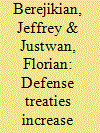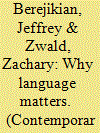| Srl | Item |
| 1 |
ID:
189270


|
|
|
|
|
| Summary/Abstract |
Do security guarantees affect people's willingness to spend their country's “blood and treasure” in a military crisis? Recent research finds that international legal commitments reshape domestic policy preferences. However, the focus of that scholarship is traditionally on issues such as human rights that define a society's normative obligations. In this study, we deploy two original survey experiments in the United States describing a potential military crisis on the Korean peninsula. We find that increasing the salience of the 1953 agreement between Washington and Seoul increases support for military action and that individuals become both more tolerant of U.S. military deaths and North Korean civilian casualties. In addition, the breadth of these effects increases when individuals are provided more detail about the agreement. These results extend the analysis of international law and domestic preferences into the domain of national security politics.
|
|
|
|
|
|
|
|
|
|
|
|
|
|
|
|
| 2 |
ID:
174727


|
|
|
|
|
| Summary/Abstract |
Despite the obvious the risks involved in deterrence bargaining, we know surprisingly little about how the public evaluates risk during a crisis. A limited deterrence scholarship considers domestic preferences and tends to assume that the public’s risk tolerance remains stable throughout a deterrence episode. Yet, robust findings in cognitive psychology suggest that people’s risk tolerance can shift dramatically based on how the potential outcomes of military options are framed. We evaluate these competing views through a series of decision experiments grounded in prospect theory. Across an array of potential extended deterrence scenarios, we demonstrate that simply reframing the language used to describe the possible outcome of military options affects both the public’s willingness to accept risks and, therefore, their willingness to escalate the crisis. These findings condition long-standing concerns about the public’s intransigent risk disposition, which underpin research on costly signaling, deterrence traps, and nuclear self-deterrence.
|
|
|
|
|
|
|
|
|
|
|
|
|
|
|
|